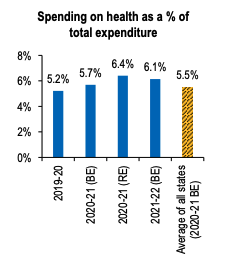
#TNBudget2021: Tamil Nadu Finance Minister Dr. Palanivel Thiaga Rajan presented the budget for the state on Friday:
Here are some highlights from our analysis: 👇
Here are some highlights from our analysis: 👇
#TNBudget2021: The Gross State Domestic Product (GSDP) in 2021-22 (at current prices) is projected to be Rs 21,36,351 crore, an annual increase of 8% over the GSDP in 2019-20.
In 2020-21, GSDP is estimated to increase by 5.3% over 2019-20 (budget estimate was 13%).
2/
In 2020-21, GSDP is estimated to increase by 5.3% over 2019-20 (budget estimate was 13%).
2/
#TNBudget2021: Total expenditure for 2021-22 is estimated to be Rs 3,29,035 crore, an annual increase of 13% over the actual expenditure in 2019-20.
Total receipts (excl. borrowings) for 2021-22 are estimated to be Rs 2,08,553 cr, an annual increase of 7.7% over 2019-20.
3/
Total receipts (excl. borrowings) for 2021-22 are estimated to be Rs 2,08,553 cr, an annual increase of 7.7% over 2019-20.
3/
#TNBudget2021: Fiscal deficit for 2021-22 is targeted at Rs 92,529 crore (4.3% of GSDP).
In 2020-21 (revised estimate), the fiscal deficit is estimated to be 4.99% of GSDP, significantly higher than the budget estimate of 2.84%.
4/
In 2020-21 (revised estimate), the fiscal deficit is estimated to be 4.99% of GSDP, significantly higher than the budget estimate of 2.84%.
4/
#TNBudget2021: A wage employment scheme to be implemented on a pilot basis to provide gainful employment to urban poor. Rs 100 crore allocated.
The tax on petrol will be reduced by Rs. 3/litre. This is estimated to cause a revenue loss of Rs 1,160 crore a year.
5/
The tax on petrol will be reduced by Rs. 3/litre. This is estimated to cause a revenue loss of Rs 1,160 crore a year.
5/
#TNBudget2021: Allocation for key sectors in 2021-22:
Education: 13.3%
Agriculture: 7.7%
Health: 6.1%
6/


Education: 13.3%
Agriculture: 7.7%
Health: 6.1%
6/



#TNBudget2021: Allocation for key sectors in 2021-22:
Roads and Bridges: 5%
Rural Development: 3%
Police: 2.8%
7/


Roads and Bridges: 5%
Rural Development: 3%
Police: 2.8%
7/



Read the full Budget Summary here: prsindia.org/budgets/states…
end/
#TamilnaduBudget #TNBudget2021 #TNAssembly
end/
#TamilnaduBudget #TNBudget2021 #TNAssembly
• • •
Missing some Tweet in this thread? You can try to
force a refresh








